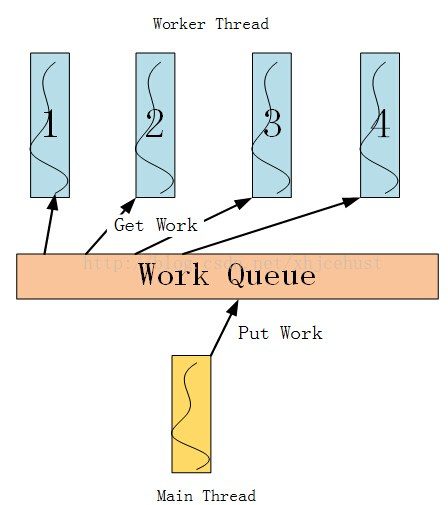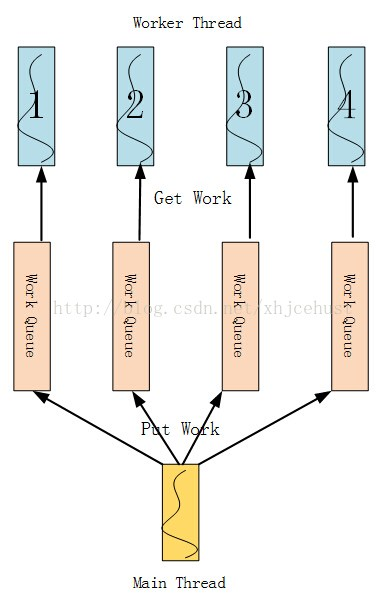一个Work Stealing Pool线程池的实现

如上图所示,工作队列由主线程和工作者线程共享,主线程将任务放进工作队列,工作者线程从工作队列中取出任务执行。共享工作队列的操作需在互斥量的保护下安全进行,主线程将任务放进工作队列时若检测到当前待执行的工作数目小于工作者线程总数,则需使用条件变量唤醒可能处于等待状态的工作者线程。当然,还有其他地方可能也会使用到互斥量和条件变量,不再赘述。
三、无锁化线程池模型

struct thread_pool;
struct future; /* Create a new thread pool with no more than n threads. */
struct thread_pool * thread_pool_new(int nthreads); void thread_pool_shutdown_and_destroy(struct thread_pool *); typedef void * (* fork_join_task_t) (struct thread_pool *pool, void * data); struct future * thread_pool_submit(
struct thread_pool *pool,
fork_join_task_t task,
void * data); void * future_get(struct future *); void future_free(struct future *);
threadpool.c
#include <stdio.h>
#include <stdlib.h>
#include <string.h>
#include <unistd.h>
#include <sys/time.h>
#include <errno.h>
#include <assert.h>
#include <pthread.h>
#include <semaphore.h>
#include <fcntl.h> #include "threadpool.h" struct future
{
fork_join_task_t task;
void *arg; //parameter
void *result;
sem_t *sem;
int status; //0: not to do, 1: doing, 2: done
int local; //1: internal task, 0: external task
struct future *prev;
struct future *next;
}; struct thread_t
{
pthread_t id;
pthread_mutex_t mutex;
pthread_cond_t cond;
int idle; //1: idle, 0: busy
int index; //record the current thread index in pool
int current_task_num; //total task number in current thread
struct thread_pool *pool; //point to the pool area
struct future *head;
struct future *tail;
}; struct thread_pool
{
int max_threads;
pthread_mutex_t mutex;
int shutdown; //1: shutdown, 0: normal
struct thread_t *threads;
struct future *head;
struct future *tail;
}; static void *thread_route(void *arg)
{
assert(arg != NULL);
struct thread_t *thread = (struct thread_t *)arg;
assert(thread != NULL);
struct thread_pool *pool = thread->pool;
assert(pool != NULL);
struct future *future = NULL; while()
{
pthread_mutex_lock(&thread->mutex);
if(future != NULL)
{
thread->idle = ;
future->status = ; //doing
future->result = future->task(pool, future->arg);
future->status = ;
sem_post(future->sem);
} while(thread->current_task_num == && pool->shutdown == )
{
//wait for task assigment
pthread_cond_wait(&thread->cond, &thread->mutex);
} if(pool->shutdown == )
{
//pool is shutdown, destroy the local task list
struct future *temp = NULL;
while(thread->head != NULL)
{
temp = thread->head;
thread->head = thread->head->next;
free(temp);
}
pthread_mutex_unlock(&thread->mutex);
pthread_exit(NULL);
} //Fist, get task from local task list to do
while(thread->head != NULL)
{
thread->idle = ;
future = thread->head;
thread->head = thread->head->next;
if(thread->tail == future)
thread->tail = NULL;
else
thread->head->prev = NULL; //call the callback to do work
thread->current_task_num--;
future->status = ; //doing
#if 0
if(pool->max_threads == && future->local == )
{
/*
* TBD: in case there is only a thread in pool
* and the task is local task
* we can create a thread to do the task?
*/
}
else
#else
{
future->result = future->task(pool, future->arg);
}
#endif
future->status = ;
sem_post(future->sem); //Let future_get know, the result is ok
}
pthread_mutex_unlock(&thread->mutex); thread->idle = ; /*
* The local task work are done, go to global task list to get task
* or go to other work thread to get task.
*/ //Step1: Go to globacl task list to get task(From Head)
pthread_mutex_lock(&pool->mutex);
future = NULL;
while(pool->head != NULL && pool->head->status == )
{
//printf("Worker %d get task from global task, current_task %d\n", thread->index, thread->current_task_num);
future = pool->head;
pool->head = pool->head->next;
if(pool->tail == future)
pool->tail = NULL;
else
pool->head->prev = NULL; //Get the future, then put into the local task list?
#if 0
pthread_mutex_lock(&thread->mutex);
if(thread->head != NULL)
{
future->next = thread->head;
thread->head->prev = future;
}
else
{
thread->tail = future;
}
thread->head = future; thread->current_task_num++; pthread_mutex_unlock(&thread->mutex);
if(thread->current_task_num == )
{
//Get 10 tasks, ok, get out, give some changes to other work threads
break;
}
#else
//printf("Worked %d get one task from globack task list.\n", thread->index);
break; //get one task, break
#endif
}
pthread_mutex_unlock(&pool->mutex); //Step2: Go to other work thread task list to get task(From Tail)
if(future == NULL && thread->current_task_num == )
{
//printf("Worker %d can not get task from global task, then try other work threads, current_task %d\n", thread->index, thread->current_task_num);
future = pool->head;
int i = ;
struct thread_t *other_thread = NULL;
for(i=; i<pool->max_threads; i++)
{
if(i == thread->index)
continue; //myself if(pool->threads[i].current_task_num == )
continue; //it has no task //lock it?
pthread_mutex_lock(&pool->threads[i].mutex);
other_thread = (struct thread_t *)&pool->threads[i];
while(other_thread->tail != NULL && other_thread->tail->status == )
{
future = other_thread->tail;
other_thread->tail = other_thread->tail->prev;
if(future == other_thread->head)
other_thread->head = NULL;
else
other_thread->tail->next = NULL; //Get the future, then put into our local task list?
#if 0
pthread_mutex_lock(&thread->mutex);
if(thread->head != NULL)
{
future->next = thread->head;
thread->head->prev = future;
}
else
{
thread->tail = future;
}
thread->head = future; thread->current_task_num++;
printf("Worker %d get task from other thread task, current_task %d\n", thread->current_task_num);
pthread_mutex_unlock(&thread->mutex);
if(thread->current_task_num == )
{
//Get 4 tasks, ok, get out, give some changes to other work threads
break;
}
#else
//printf("Worked %d get one task from other worker %d.\n", thread->index, i);
break; //get one task, break
#endif
}
pthread_mutex_unlock(&pool->threads[i].mutex);
}
}
}
} struct thread_pool * thread_pool_new(int nthreads)
{
struct thread_pool *pool = (struct thread_pool *)malloc(sizeof(struct thread_pool));
assert(pool != NULL); pool->max_threads = nthreads;
pool->head = pool->tail = NULL; pthread_mutex_init(&pool->mutex, NULL); pool->threads = (struct thread_t *)malloc(nthreads * sizeof(struct thread_t));
assert(pool->threads != NULL); int i = ;
for(i=; i<pool->max_threads; i++)
{
pthread_mutex_init(&pool->threads[i].mutex, NULL);
pthread_cond_init(&pool->threads[i].cond, NULL);
pool->threads[i].idle = ; //idle
pool->threads[i].index = i;
pool->threads[i].pool = pool; //point to the pool area
pool->threads[i].current_task_num = ;
pthread_create(&pool->threads[i].id, NULL, thread_route,(void *)(&pool->threads[i]));
} return pool;
} struct future * thread_pool_submit(
struct thread_pool *pool,
fork_join_task_t task,
void * data)
{
assert(pool != NULL);
struct future *future = (struct future *)malloc(sizeof(struct future));
assert(future); future->task = task;
future->arg = data;
future->prev = future->next = NULL;
future->result = NULL;
future->status = ;
future->local = ; //default is external task int i = ;
unsigned long myself_pid = pthread_self();
for(i=; i<pool->max_threads; i++)
{
if(pool->threads[i].id == myself_pid)
{
future->local = ; //it is internal task
break;
}
} future->sem = (sem_t *)malloc(sizeof(sem_t));
assert(future->sem != NULL);
sem_init(future->sem, , ); //find a idle work thread to put the task
struct thread_t * thread = NULL;
for(i = ; i< pool->max_threads; i++)
{
thread = &pool->threads[i];
pthread_mutex_lock(&thread->mutex);
if(thread->idle == )
{
//find it, insert the task from head
if(thread->head != NULL)
{
future->next = thread->head;
thread->head->prev = future;
}
else
{
thread->tail = future;
}
thread->head = future; thread->current_task_num++; //Just let work thread know, it has work to do
if(thread->current_task_num == )
{
//printf("%s(): Let worker %d to start to work\n", __FUNCTION__, thread->index);
pthread_cond_signal(&thread->cond);
}
pthread_mutex_unlock(&thread->mutex); return future;
}
pthread_mutex_unlock(&thread->mutex);
} //can not find idle work thread, just put it into global task list
//printf("%s(): no find idle work thread, just put into global task list\n", __FUNCTION__);
pthread_mutex_lock(&pool->mutex);
if(pool->head != NULL)
{
future->next = pool->head;
pool->head->prev = future;
}
else
{
pool->tail = future;
}
pool->head = future;
pthread_mutex_unlock(&pool->mutex); return future;
} void * future_get(struct future *future)
{
assert(future);
sem_wait(future->sem); //wait for the result ready
return (void *)future->result; }
完整的代码,请看我的GitHub:
一个Work Stealing Pool线程池的实现的更多相关文章
- 分享一个自制的 .net线程池
扯淡 由于项目需求,需要开发一些程序去爬取一些网站的信息,算是小爬虫程序吧.爬网页这东西是要经过网络传输,如果程序运行起来串行执行请求爬取,会很慢,我想没人会这样做.为了提高爬取效率,必须使用多线程并 ...
- 一个Linux下C线程池的实现
什么时候需要创建线程池呢?简单的说,如果一个应用需要频繁的创建和销毁线程,而任务执行的时间又非常短,这样线程创建和销毁的带来的开销就不容忽视,这时也是线程池该出场的机会了.如果线程创建和销毁时间相比任 ...
- 一个boost底下的线程池
Boost的thread库中目前并没有提供线程池,我在sorceforge上找了一个用boost编写的线程池.该线程池和boost结合的比较好,并且提供了多种任务执行策略,使用也非常简单. 下载地址: ...
- 一个简单的python线程池框架
初学python,实现了一个简单的线程池框架,线程池中除Wokers(工作线程)外,还单独创建了一个日志线程,用于日志的输出.线程间采用Queue方式进行通信. 代码如下:(不足之处,还请高手指正) ...
- 一个简单的linux线程池(转-wangchenxicool)
线程池:简单地说,线程池 就是预先创建好一批线程,方便.快速地处理收到的业务.比起传统的到来一个任务,即时创建一个线程来处理,节省了线程的创建和回收的开销,响应更快,效率更高. 在linux中,使用的 ...
- 一个Windows C++的线程池的实现
此线程池所依赖的线程类,请参看<一个Windows C++的线程类实现>: http://blog.csdn.net/huyiyang2010/archive/2010/08/10/580 ...
- Windows下一个比较完美的线程池实现(使用线程池实现的Http上传下载实现)
http://blog.csdn.net/fishjam/article/details/8632049 http://download.csdn.net/user/fishjam
- Spring Thread Pool 线程池的应用
Spring and Java Thread example 扫扫关注"茶爸爸"微信公众号 坚持最初的执着,从不曾有半点懈怠,为优秀而努力,为证明自己而活. Download it ...
- ExecutorService 建立一个多线程的线程池的步骤
ExecutorService 建立一个多线程的线程池的步骤: 线程池的作用: 线程池功能是限制在系统中运行的线程数. 依据系统的环境情况,能够自己主动或手动设置线程数量.达到执行的最佳效果:少了浪费 ...
随机推荐
- codevs 4888 零件分组
4888 零件分组 时间限制: 1 s 空间限制: 16000 KB 题目等级 : 黄金 Gold 题解 查看运行结果 题目描述 Description 现有一些棍状零件,每个零件都有 ...
- Kendo UI 模板概述
Kendo UI 模板概述 Kendo UI 框架提供了一个易用,高性能的 JavaScript 模板引擎.通过模板可以创建一个 HTML 片段然后可以和 JavaScript 数据合并成最终的 HT ...
- Mac下安装ElasticSearch及其插件
目录 环境介绍 安装过程 安装Kibana 环境介绍 软件版本:ElasticSearch7.0.0 Kibana7.0.0 系统环境:mac 环境 安装过程 官网下载 ElasticSearch7. ...
- checkbox 全选 单选的使用
绑定数据 if (!IsPostBack) { using (UsersDataContext con = new UsersDataContext()) { Repeater1.DataSource ...
- javaSe-String/StringBuffer
//String字符串.在进行字符串拼接的时候总是改变栈中指向堆中的位置 //StringBuffer字符串.在进行字符串拼接的时候不改变栈中指向堆中的位置 package com.java.chap ...
- jsp四大作用域之request
<%@ page language="java" contentType="text/html; charset=utf-8" pageEncoding= ...
- HDU 1850 Being a Good Boy in Spring Festival 在春节做乖孩子(Nim博弈,微变形)
题意: 思路: 如果全部扑克牌数目异或的结果ans为0,则必输,输出0.否则,必须要给对方一个P状态,可以对所有扑克堆进行逐个排查,将ans^a[i]就可以得到除了a[i]之外其他扑克数的异或结果tm ...
- COGS 2794. 爱摔跤的比利海灵顿
★☆ 输入文件:find_k.in 输出文件:find_k.out 简单对比时间限制:1.4 s 内存限制:128 MB [题目描述] B•海灵顿•雷想要和n个巨人比试摔♂跤,他想先和 ...
- 面试题-谈谈你对Java平台的理解
平台无关性 GC 语言特性 面向对象 类库 异常处理 一次编译到处运行 JVM如何加载Class文件 Java反射 ClassLoader 种类 双亲委派机制 loadcalss和forName
- 重新postgresql出现错误:Problem running post-install step. Installation may not complete correctly. The database cluster initialisation failed.
以前正常使用的postgresql,今天出现问题:报*.dll错误.百度了一下,只能重新安装 . 在重新安装过程中报:Problem running post-install step. Instal ...
